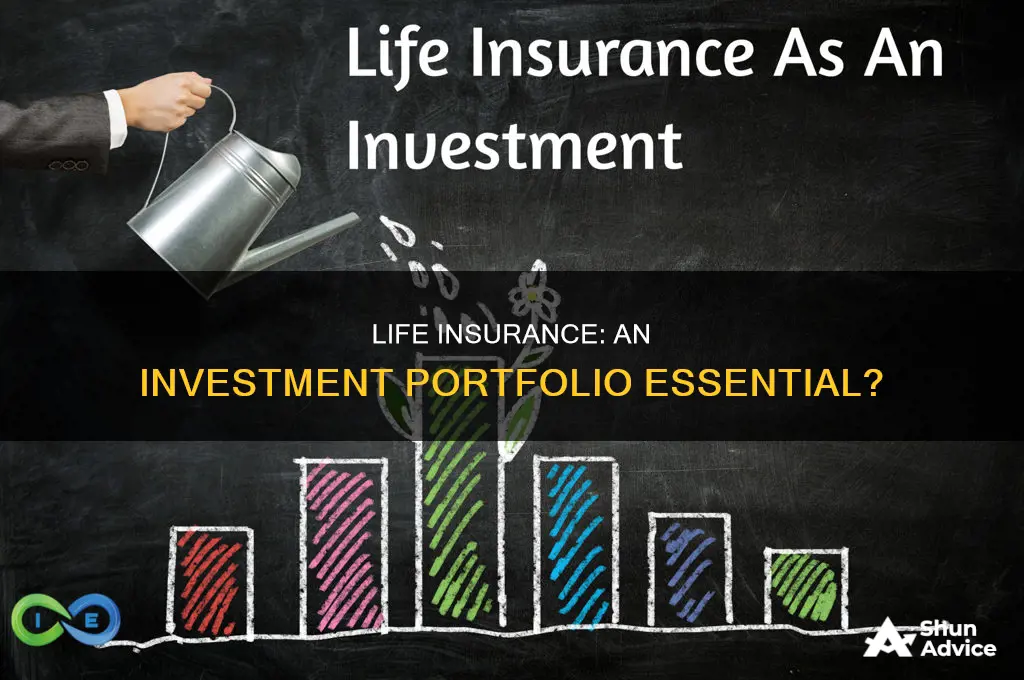
Life insurance is often viewed as a way to provide financial security for loved ones after death. However, it can also be used as an investment tool during your lifetime. This is achieved through permanent life insurance policies, which allow you to accumulate a cash value that can be borrowed against or withdrawn. This cash value grows tax-deferred, providing potential tax advantages.
There are two main types of permanent life insurance: whole life insurance and universal life insurance. Whole life insurance offers fixed premiums and guaranteed cash value growth, while universal life insurance provides more flexibility, allowing adjustments to premiums and death benefits.
While life insurance can provide investment opportunities, it also has drawbacks. The fees, charges, and high premiums associated with permanent life insurance can impact overall returns. Additionally, the cash value growth rates are typically lower compared to traditional investments.
Therefore, when considering life insurance as part of an investment portfolio, it is essential to weigh the benefits against the costs and explore other investment options to make an informed decision.
What You'll Learn

Whole life insurance
Premiums and Coverage
Cash Value Accumulation
One of the most significant advantages of whole life insurance is its ability to accumulate cash value over time. A portion of the premiums paid goes into a cash value account, which grows at a minimum guaranteed rate set by the insurer. This accumulation is tax-deferred, meaning any interest earned is not taxed as long as the funds remain in the policy. Policyholders can access this cash value through withdrawals, loans, or by surrendering the policy, although there may be fees and tax implications associated with these actions.
Dividends
Investment Options
While whole life insurance offers stable and guaranteed returns, the cash value's rate of return is often modest, typically ranging from 1% to 3.5%. Additionally, policyholders do not have direct control over their investment portfolio, as the insurance company declares the dividend or interest rate and manages the investments. For those seeking higher returns or more control over their investments, other options may be more suitable.
Estate Planning
Flexibility
In conclusion, while whole life insurance may not be suitable for everyone due to its high premiums and slow cash value growth, it can be a valuable investment and savings tool for those seeking stable, guaranteed returns, estate planning advantages, and lifelong coverage for their dependents.
Building a Diverse Investment Portfolio: Wages and Strategies
You may want to see also

Universal life insurance
One of the main advantages of universal life insurance is its flexibility. Policyholders can choose the amount of their death benefit and how much they pay in premiums, as well as when they pay them. This flexibility can be beneficial for those with fluctuating cash flow or variable income, such as self-employed individuals or business owners. Additionally, universal life insurance allows for potential cash value growth. The cash value component functions like a savings account, earning interest over time, which can be borrowed against or withdrawn for various purposes, such as emergencies, home repairs, or business investments.
However, there are also some disadvantages to consider. Universal life insurance policies do not guarantee returns, and there is a risk of large payment requirements or policy lapse if the cash value falls too low. Additionally, some withdrawals from the policy may be subject to taxation. It's important to carefully monitor the cash value to ensure the policy remains adequately funded and to avoid potential lapses.
When compared to whole life insurance, universal life insurance offers more flexibility in terms of premiums and death benefits. Whole life insurance typically has fixed premiums and a guaranteed death benefit, while universal life insurance allows for adjustments. Additionally, universal life insurance may offer lower initial premiums, but it's important to note that they can increase over time as the policyholder ages.
In summary, universal life insurance can be a valuable component of an investment portfolio, offering flexibility, a savings component, and the ability to borrow or withdraw funds. However, it's important to carefully consider the potential risks, such as variable interest rates and the possibility of lapses, and ensure that it aligns with your financial goals and risk tolerance.
S-Corp Savings: Investing for Growth and Security
You may want to see also

Variable universal life insurance
Pros
- Control over cash value investments: You can choose how to invest your cash value to align with your risk tolerance and investment objectives.
- High growth potential: By investing your cash value in the market, you have the potential to earn higher returns compared to other types of permanent life insurance.
- Adjustable premiums: Like traditional universal life insurance, you can adjust how much you pay into the policy each year to fit your budget.
Cons
- Risk of cash value losses: The return on your cash value is not guaranteed. Poor investment performance can result in slower growth or even losses.
- Possible increase in premiums: If your cash value is insufficient to cover the cost of your life insurance, you may need to increase your premium payments to maintain coverage.
- High fees and charges: Variable universal life insurance typically involves higher fees because you're paying for both life insurance and investments. There may also be a surrender charge if you cancel the policy early.
Saving and Investing: Your Guide to Financial Freedom
You may want to see also

Tax advantages
Life insurance is a financial asset that can benefit your loved ones after you pass away. However, it can also be used as an investment tool during your lifetime. Here are some of the tax advantages of including life insurance in your investment portfolio:
Tax-Free Death Benefit:
The death benefit from both term and permanent life insurance policies is generally paid to the beneficiary free of federal income tax. This provides a tax-efficient way to ensure your family has the financial resources they need to maintain their standard of living, pay off mortgages or debts, or fund education plans.
Tax-Deferred Cash Value Growth:
Permanent life insurance policies, such as whole life insurance, allow your premium to fund not only a tax-free death benefit but also a cash value account that grows tax-deferred. This means that as long as the policy remains in force, you won't owe taxes on the growth of your policy's cash value, potentially enabling you to accumulate more savings over time. This feature can be particularly advantageous for those in higher tax brackets during their working years who expect to be in a lower tax bracket during retirement when withdrawals are made.
Tax-Advantaged Withdrawals and Loans:
Permanent life insurance policies offer flexibility in accessing the cash value of your policy through tax-advantaged loans or withdrawals. You can borrow against the cash value or make a partial surrender (withdrawal) of the cash value up to the "cost basis" (the total premiums paid) without incurring income tax. This provides the benefit of supplementing your retirement income, paying for unexpected medical bills, or funding future expenses, such as education, in a tax-efficient manner.
It is important to note that loans and withdrawals from the cash value may affect the death benefit amount and could require additional premiums to maintain the policy. Additionally, if the policy lapses with an outstanding loan that exceeds the cost basis, it becomes taxable.
Savings or Investments: The Best Way to Utilize Your 100K
You may want to see also

Peace of mind
Protection for Loved Ones
Life insurance provides financial security for your loved ones in the event of your death. It ensures they will be taken care of and can maintain their standard of living, even if they lose your income. This can be especially important if you have dependents or a disabled child who will be financially dependent on you beyond a typical term life insurance policy period.
Retirement Planning
Life insurance can also offer peace of mind for your retirement. The cash value component of permanent life insurance policies grows over time and can provide an additional income stream during your retirement years. This can be a valuable supplement to your retirement portfolio, giving you extra funds to rely on.
Tax Benefits
The cash value in permanent life insurance policies grows tax-deferred. This means you don't pay taxes on the funds as they grow, providing a tax advantage over other types of investments. Additionally, if structured correctly, death benefits are generally income-tax-free for your beneficiaries.
Access to Funds
Life insurance policies with a cash value component allow you to access funds in several ways. You can borrow against the policy's cash value or withdraw funds to cover expenses such as a mortgage or college education. This flexibility can provide peace of mind, knowing you have access to financial support when needed.
Long-Term Financial Goals
Including life insurance as part of your comprehensive investment plan can help secure long-term financial stability. The cash value component grows over time and, in some cases, can even be used to take out a loan or as collateral for a loan, helping you achieve your financial goals.
In conclusion, life insurance can provide peace of mind not only for your loved ones but also for yourself, by offering financial protection, retirement income, and flexibility in accessing funds. However, it's important to carefully consider the potential drawbacks, such as fees, charges, and limited flexibility, before deciding if life insurance is the right investment choice for your needs.
Young Adults: Best Places to Invest Your Savings
You may want to see also







